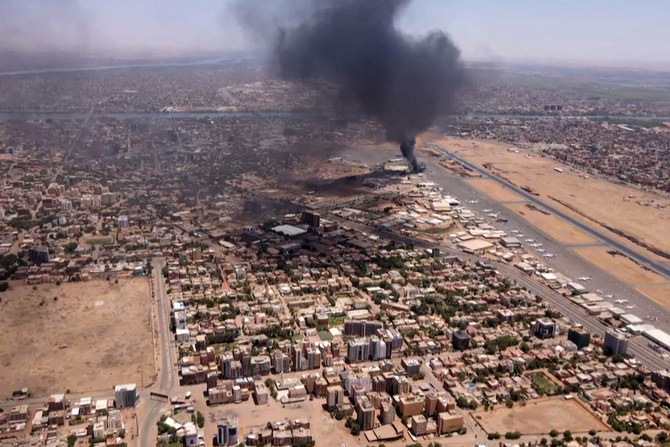KHARTOUM: Sudan’s warring forces clashed again in the nation’s capital early Friday, with bombing and shelling reported in several areas of Khartoum, as they ignored appeals by world powers for an end-of-Ramadan cease-fire.
Both UN Secretary-General Antonio Guterres and US Secretary of State Antony Blinken called separately for a cease-fire of “at least” three days to mark Eid Al-Fitr in the mostly Muslim country, as explosions and gunfire resounded in the capital Khartoum for the sixth straight night.
“On the night of Eid Al-Fitr, several areas of Khartoum were bombed and are still exposed to shelling and clashes between the armed forces and the RSF,” the Central Committee of Sudan Doctors said in a statement.
“We call on all citizens to exercise caution, stay home, close doors and windows and lie down. We also call on these forces to be responsible and immediately stop fighting to protect innocent lives.”
The capital has borne the brunt of some of the fiercest fighting, with most of its five million people sheltering at home without electricity, food or water.
Residents have struggled to sleep for nearly a week and been jolted awake by “the roaring sound of fighter jets and air strikes,” said Nazek Abdalla, a 38-year-old in southern Khartoum.
“We locked our doors and windows, hoping no stray bullets would hit our building, Abdalla added. “We wish the fighting would stop during Eid festivities. We know it will not happen though.”
Blinken “condemned the indiscriminate fighting” in separate conversations with both Burhan and Daglo, his spokesperson said in a Friday statement.
“He urged both military leaders to implement and uphold a nationwide cease-fire and sustain it through at least the end of Eid Al-Fitr, Sunday, April 23,” the statement said.
As battles raged Friday, Burhan appeared on television for the first time since hostilities began, to deliver an Eid address as in previous years.
Sitting behind a desk, dressed in military uniform and backgrounded by two Sudanese flags, he made no mention of a truce.
“For Eid this year, our country is bleeding: destruction, desolation and the sound of bullets have taken precedence over joy,” he said.
“We hope that we will come out of this ordeal more united... a single army, a single people... toward a civilian power.”
After two cease-fires failed to take hold in two days, gunfire continued Thursday night, with columns of black smoke rising from buildings around Khartoum International Airport and the army headquarters.
While many sheltered at home, others were venturing out despite the risks “to protect themselves and their families,” said architect Tagreed Abdin.
Beyond Khartoum, witnesses reported loud explosions in the city of Obeid, in the central state of North Kordofan.
“It reeks of death in some parts of town,” said one witness in Obeid.
The World Health Organization said Friday that 413 people have died and almost 3,551 more had been wounded in the fighting.
The fighting has taken a heavy toll on civilians, with the UN children’s agency UNICEF saying “at least nine children have reportedly been killed.”The World Food Programme (WFP) warned that the violence could plunge millions more into hunger in a country where 15 million people — one-third of the population — already face food insecurity.
It has suspended its Sudan operations after the killing of three WFP workers on Saturday.
Burhan and Daglo’s bitter dispute centered on the planned integration of the RSF into the regular army, a key condition for a final deal aimed at restoring Sudan’s democratic transition.
Around Khartoum and elsewhere, RSF fighters in armored vehicles and pickups mounted with machine guns have taken over the streets.
Many have mounted checkpoints to search cars carrying civilians trying to escape the worst battle zones to safer areas in Khartoum and beyond.
Civilians are becoming increasingly desperate — by Tuesday, thousands had fled the capital, with many reporting streets strewn with corpses.
Medics have warned of a catastrophe, especially in Khartoum, where many hospitals were reportedly caught in the crossfire.
Up to 70 percent of the hospitals in Khartoum and neighboring states have been rendered “out of service” by the fighting, the doctors’ union said.
It has warned the death toll is likely to be far higher than stated, with many wounded unable to reach hospitals.
Several countries’ evacuation plans have been put on hold, with the US Defense Department announcing Thursday that it was deploying forces “nearby in the region” with hopes of “securing and potentially facilitating the departure of US Embassy personnel from Sudan.”
The Sudanese army said 177 Egyptian soldiers were evacuated from the northern city of Meroe to Egypt, which confirmed their arrival. The RSF said later that it handed over another 27 Egyptian soldiers to the Sudanese Red Cross, and Cairo confirmed their arrival at Egypt’s Khartoum embassy.
The United Arab Emirates said it had “led” the mediation for the Egyptians held by the RSF.
Burhan and Daglo toppled autocratic president Omar Al-Bashir together in April 2019 following massive protests against three decades of iron-fisted rule.
In October 2021, they again worked together to oust the civilian government installed after Bashir’s downfall, derailing an internationally backed transition to democracy.


























